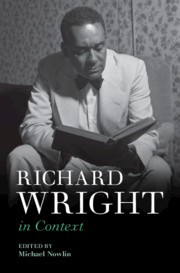Book contents
- Richard Wright in Context
- Richard Wright in Context
- Copyright page
- Contents
- Figures
- Contributors
- Abbreviations
- Richard Wright’s Works: A Chronology
- Introduction Richard Wright’s Luck
- Part I Life and Career, Times and Places
- Part II Social and Cultural Contexts
- Part III Literary and Intellectual Contexts
- Chapter 17 Chicago Sociology
- Chapter 18 1930s Proletarian Fiction
- Chapter 19 The Blues in Print
- Chapter 20 Realism and Modernism, Solipsism and Solidarity
- Chapter 21 The Literary Mainstream: Story and the Book-of-the-Month Club
- Chapter 22 Wright, Psychoanalysis, and Fredric Wertham’s Reading of Hamlet
- Chapter 23 Wright’s Black Boy in Context
- Chapter 24 Wright and Women Authors
- Chapter 25 Existentialism
- Chapter 26 Wright and Les Temps Modernes
- Chapter 27 Wright and Postcolonial Thought
- Chapter 28 Modern Poetry and Haiku
- Part IV Reputation and Critical Reception
- Index
Chapter 17 - Chicago Sociology
from Part III - Literary and Intellectual Contexts
Published online by Cambridge University Press: 08 July 2021
- Richard Wright in Context
- Richard Wright in Context
- Copyright page
- Contents
- Figures
- Contributors
- Abbreviations
- Richard Wright’s Works: A Chronology
- Introduction Richard Wright’s Luck
- Part I Life and Career, Times and Places
- Part II Social and Cultural Contexts
- Part III Literary and Intellectual Contexts
- Chapter 17 Chicago Sociology
- Chapter 18 1930s Proletarian Fiction
- Chapter 19 The Blues in Print
- Chapter 20 Realism and Modernism, Solipsism and Solidarity
- Chapter 21 The Literary Mainstream: Story and the Book-of-the-Month Club
- Chapter 22 Wright, Psychoanalysis, and Fredric Wertham’s Reading of Hamlet
- Chapter 23 Wright’s Black Boy in Context
- Chapter 24 Wright and Women Authors
- Chapter 25 Existentialism
- Chapter 26 Wright and Les Temps Modernes
- Chapter 27 Wright and Postcolonial Thought
- Chapter 28 Modern Poetry and Haiku
- Part IV Reputation and Critical Reception
- Index
Summary
When Richard Wright read deeply in the social sciences, he became informally trained in the Chicago school of sociology led by Robert Park. Chicago sociology was an antidote to the idea of race. It replaced the dominant view of group-based identity as determined by race with a truer view of group-based identity determined by culture and environment: a paradigm of culture as not immutable, genetically inherited, natural, and hierarchical, but rather as malleable, learned, conventionally arbitrary, and relative. This social science vision undergirded his fiction, especially his most famous novel Native Son. But while Chicago sociology denied white racial superiority, it tended to accept white cultural supremacy, a contention shared by the legal strategy that led to Brown v. Board of Education and desegregation. Critics have frequently misunderstood Wright as a progenitor of late twentieth-century multicultural literature. That recognition more properly belongs to Wright’s rival Zora Neale Hurston, who had a different social-science-inspired model of minority culture that allowed her to see African American culture as healthy, continually creative, adaptive, and long-enduring.
- Type
- Chapter
- Information
- Richard Wright in Context , pp. 185 - 195Publisher: Cambridge University PressPrint publication year: 2021

